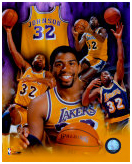Are you a Quiet Speculation member?
If not, now is a perfect time to join up! Our powerful tools, breaking-news analysis, and exclusive Discord channel will make sure you stay up to date and ahead of the curve.
The Beginner's Guide series offers advice to new to Modern players and dispels common myths about the format's workings. This week, inspired by some consistent misplays I've observed, I am going to be tackling Modern's control decks. There appears to be a perception that they're something to tread carefully around. But control is just another archetype, and there's no reason to play scared.
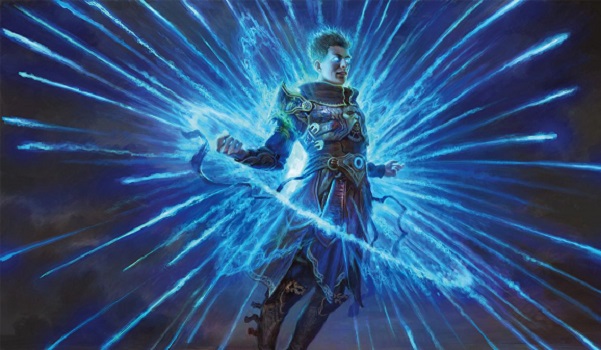
Blue-based control is one of the top-performing archetypes in Modern right now. Some even say UW Control is the best deck in Modern. Regardless, top-tier control decks are a fairly recent addition to the metagame. Consequently, Modern players don't have much experience playing against Modern control decks. Standard players have a leg up on 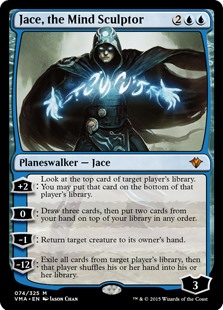 Modern in this regard, as control decks have been top-tier for some time. However, the experience doesn't translate well, as the strategies differ dramatically.
Modern in this regard, as control decks have been top-tier for some time. However, the experience doesn't translate well, as the strategies differ dramatically.
The recent version of Standard UW Control is almost entirely reactive. It piled answers and card draw on top of each other, winning by looping Teferi, Hero of Dominaria. Modern's control decks also play lots of answers and card advantage, but they're more about buying time and space to land a win condition and then ride it to victory. This difference in strategy means that players relying on their Standard experience are playing the matchups wrong.
Know Thy Enemy
The classic aggro/control dichotomy says that aggro decks try to actively win the game while control seeks to prolong the game. Alternatively, aggro wants to end the game by winning, while control functionally wins the game, and then ends the game as an afterthought.
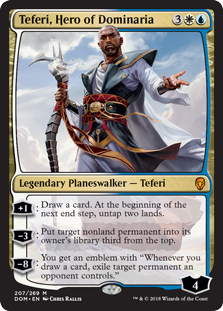 Compare Dominaria Standard UW Control to Modern UW. The Standard deck has a wide variety of hard answers and 5-8 sweepers. The Modern decks lean heavily on 4 Terminus, 4 Path to Exile, and a few counters. Standard has at most three Teferi and two Approach of the Second Sun to actually win the game, while Modern has 3-4 Celestial Colonnade, 4-5 planeswalkers, 2 Snapcaster Mage, and occasionally some number of Vendilion Clique. Standard plays a variety of card draw spells; Modern is dependent on cantrips and Search for Azcanta // Azcanta, the Sunken Ruin.
Compare Dominaria Standard UW Control to Modern UW. The Standard deck has a wide variety of hard answers and 5-8 sweepers. The Modern decks lean heavily on 4 Terminus, 4 Path to Exile, and a few counters. Standard has at most three Teferi and two Approach of the Second Sun to actually win the game, while Modern has 3-4 Celestial Colonnade, 4-5 planeswalkers, 2 Snapcaster Mage, and occasionally some number of Vendilion Clique. Standard plays a variety of card draw spells; Modern is dependent on cantrips and Search for Azcanta // Azcanta, the Sunken Ruin.
This difference in strategy is critical to understanding how to play against Modern control. Standard UW is a truer control deck than Modern. The answers in Standard may be less efficient than in Modern, but it plays more of them and wins well after the game is won. Modern is about precisely using tools to exhaust the opponent, dropping a win condition, and then protecting it as would a tempo deck. Terminus tucks creatures back into the library; they're not gone for good, and in a long game will return. The goal is to stall the game long enough for Jace or Teferi to take over and convince the opponent things are hopeless, but not so long that Terminus-returned creatures start to matter. Standard in contrast is perfectly capable of actually answering everything, drawing its entire deck, and winning by naturally decking their opponent, a control ideal.
What Matters
Time is the critical factor when playing against control, both in the literal sense (as especially in control mirrors, the game clock can become a factor) and the mechanical sense (regarding tempo and resources). Modern players must restrict control's clock and force them to take the initiative. Doing anything else is allowing control to execute its ideal gameplan. If it can be avoided, never give control players extra time.
Counterspell Conundrum
Counterspells are a relatively recent addition to Modern control. While Jeskai has always hung around, Grixis was the control deck of choice for years. Combined with Jund's prevalence, counterspells took a back seat to targeted discard for years in slower decks, which may have caused players to forget how to play against permission.
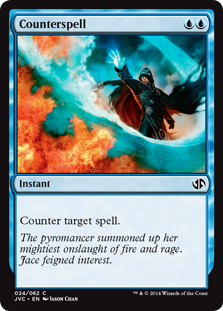 Never play around counterspells unless there is a definite and advantageous strategic reason to do so. Specifically, correctly playing around counters requires that 1) waiting makes the counter a dead card, and/or 2) it advantages you more than the control player. This is especially true of the early game. Fear of having a spell countered is largely irrational, and the more time provided to a control deck, the more likely it is to win. Playing around Mana Leak makes no sense if the card will never be rendered dead, or if doing so inhibits advancing your own gameplan. Scaring opponents into inaction is far more powerful than actually countering anything. Therefore, most decks should treat opposing counters as situational removal rather than disruption, and just play their spells.
Never play around counterspells unless there is a definite and advantageous strategic reason to do so. Specifically, correctly playing around counters requires that 1) waiting makes the counter a dead card, and/or 2) it advantages you more than the control player. This is especially true of the early game. Fear of having a spell countered is largely irrational, and the more time provided to a control deck, the more likely it is to win. Playing around Mana Leak makes no sense if the card will never be rendered dead, or if doing so inhibits advancing your own gameplan. Scaring opponents into inaction is far more powerful than actually countering anything. Therefore, most decks should treat opposing counters as situational removal rather than disruption, and just play their spells.
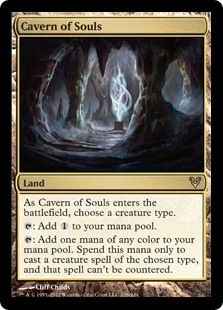 Some decks can play around counters by playing through them, such as UW Spirits playing Aether Vial and Cavern of Souls and Jund using discard to clear the road for threats. Their design makes playing around correct. However, most decks can only play around counters by just waiting for a better opportunity to play their spells. Unless said deck has crafted its strategy to force such a gamestate, the plan is unlikely to work. When not under pressure, control is free to draw cards and play lands, which is all it wants to do, and isn't likely to create an opening on its own.
Some decks can play around counters by playing through them, such as UW Spirits playing Aether Vial and Cavern of Souls and Jund using discard to clear the road for threats. Their design makes playing around correct. However, most decks can only play around counters by just waiting for a better opportunity to play their spells. Unless said deck has crafted its strategy to force such a gamestate, the plan is unlikely to work. When not under pressure, control is free to draw cards and play lands, which is all it wants to do, and isn't likely to create an opening on its own.
Burn is a master of forcing control to tap out and generate that opening. After the initial flurry of spells, if Burn has control under ten life, it can just wait until it can cast multiple instants on control's endstep, draw out all the counters, and then finish with sorceries on its own turn. Thus, the control player must tap out to win the game first, which naturally gives Burn the opening to finish the job. Since most decks can't put this kind of pressure on control and therefore can't gain significant advantage by waiting, they shouldn't worry about playing into counters.
Take Advantage
Another reason not to fear counters is that the control player probably doesn't have one. Counterspells may be more popular and prevalent now than they have been before, but UWx only plays around eight, of which four are the expensive Cryptic Command. Odds are there was no point in playing around the counter in the first place. Even if they do counter a spell, it will probably be a favorable mana exchange and therefore to your 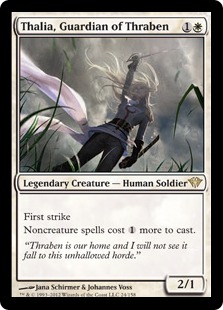 advantage. A second reason is every counter spent early is one not spent later. Trading Leak for Thalia, Guardian of Thraben is a fairly neutral exchange, but Leaking Primeval Titan is devastating. Let control counter the cheap spells so they can't counter the game winners!
advantage. A second reason is every counter spent early is one not spent later. Trading Leak for Thalia, Guardian of Thraben is a fairly neutral exchange, but Leaking Primeval Titan is devastating. Let control counter the cheap spells so they can't counter the game winners!
The final reason to just jam into counters is that even if the control player has them, the may just let it go. I and every other control player in Magic has died at least once to spells they could have countered but did not because we wanted to get more value countering something better. Control decks are full of answers, so it seems reasonable to let that otherwise useless Reflector Mage through because you'll just Lightning Bolt it later. Cue the end of the game where I used all my removal killing subsequent threats and died to the Mage with three counters in hand. Just jam spells at the control deck; they may flinch and let you win.
Know Thyself
The other half of playing against control depends on your own deck. In the classic world of Who's the Beatdown, one deck is the aggressor while the other defends. Control decks are built to be defensive, but that doesn't mean they have to be. It is possible and in fact optimal to force control out of its comfort zone. When that isn't possible, it's critical to understand how the matchup actually works, and to play to your deck's strengths. Oftentimes, it's best to just put your head down and charge right at control. This is not a great strategy as Modern control decks assume that will happen and are built accordingly. However, depending on the deck, it may be the only option.
In this section, we'll look at ways each macro-archetype can navigate control matchups.
Aggro
For the guaranteed aggressor in a match, the keys to victory lie with exploiting strategic holes in the control deck and with properly managing pressure. The former key is dictated by how the control deck is built. Every deck has blind spots, and if the aggressive deck has the option to play into them, it should. The latter is about keeping control on the back foot in the face of removal and sweepers.
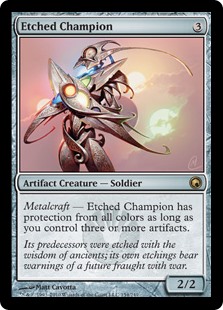 Classic Affinity vs Jeskai Control should be a slaughter. Affinity is filled with tiny creatures that die to one-for-one removal, and Jeskai plays nothing but cheap removal. There are very few cards that actually threaten Jeskai on their own, so Jeskai can afford to be judicious with its removal and clean up the Memnites and Vault Skirges once the Arcbound Ravagers and Signal Pests are gone. However, most Jeskai lists only have two Supreme Verdicts, which are the only ways it can remove resolved Etched Champion. Thus, the matchup is actually about forcing Jeskai to use its counters and Verdicts on non-Champions. If Affinity succeeds in doing that, it can steal an easy win.
Classic Affinity vs Jeskai Control should be a slaughter. Affinity is filled with tiny creatures that die to one-for-one removal, and Jeskai plays nothing but cheap removal. There are very few cards that actually threaten Jeskai on their own, so Jeskai can afford to be judicious with its removal and clean up the Memnites and Vault Skirges once the Arcbound Ravagers and Signal Pests are gone. However, most Jeskai lists only have two Supreme Verdicts, which are the only ways it can remove resolved Etched Champion. Thus, the matchup is actually about forcing Jeskai to use its counters and Verdicts on non-Champions. If Affinity succeeds in doing that, it can steal an easy win.
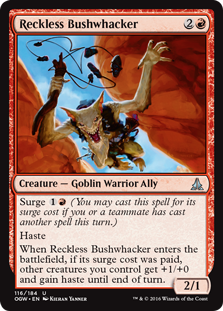 There's also the classic playing-around-sweepers strategy. Holding extra creatures to rebuild the board after Wrath of God is a tried-and-true technique. However, it's extremely contextual. The trick is to use enough resources to force control's hand by actually threatening a kill. A common strategy is to use enough cards to put control dead on board, with leeway for a removal spell, and then hold back. Should control hit Terminus, aggro should be able to threaten lethal the turn afterwards. For this reason, counterspells and the aggro-control archetype have a long and successful history against control.
There's also the classic playing-around-sweepers strategy. Holding extra creatures to rebuild the board after Wrath of God is a tried-and-true technique. However, it's extremely contextual. The trick is to use enough resources to force control's hand by actually threatening a kill. A common strategy is to use enough cards to put control dead on board, with leeway for a removal spell, and then hold back. Should control hit Terminus, aggro should be able to threaten lethal the turn afterwards. For this reason, counterspells and the aggro-control archetype have a long and successful history against control.
Not every deck can afford to hold back, as their clock isn't robust enough. Merfolk can definitely play around sweepers because lords make weak creatures good, but 8-Whack cannot. It needs a critical mass of weak creatures plus an enabler to do anything worthwhile. Unless it can explode twice, 8-Whack is better off pretending sweepers don't exist. Just as with counterspells, aggro should only play around sweepers if it can meaningfully rebuild.
Combo
Combo decks tend to have polarized strategies against control. Some, like Ironworks, must win very quickly, while Ad Nauseam can afford to wait until the last minute. The distinction is interaction. Completely uninteractive combos need to sneak their key pieces through, while interactive combos can protect themselves and ensure the win. Knowing how to play depends on the type of combo deck.
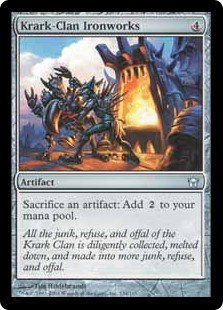 Ironworks must land a Krark-Clan Ironworks and eventually Scrap Trawler to win. It has no relevant maindeck interaction, and so has to try to sneak its pieces into play and hope the control deck has no answer. Smart sequencing and using bait spells is therefore essential for success. While these types of combo decks can and frequently do have counters of their own post-board, packing too many risks diluting the combo and making it hard to go off. Ironworks solves this problem with a transformational board featuring Sai, Master Thopterist. These decks must prioritize speed over resilience and mulligan aggressively.
Ironworks must land a Krark-Clan Ironworks and eventually Scrap Trawler to win. It has no relevant maindeck interaction, and so has to try to sneak its pieces into play and hope the control deck has no answer. Smart sequencing and using bait spells is therefore essential for success. While these types of combo decks can and frequently do have counters of their own post-board, packing too many risks diluting the combo and making it hard to go off. Ironworks solves this problem with a transformational board featuring Sai, Master Thopterist. These decks must prioritize speed over resilience and mulligan aggressively.
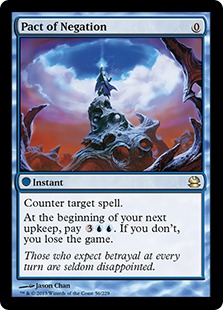 At the opposite end is Ad Nauseam. While perfectly capable of fast wins, Ad Nauseam doesn't have to rush against control because it plays Pact of Negation and combos at instant speed. It can simply wait and sculpt its hand and mana until it can either go off through counters or go off twice. Post-board, it has more counters and Boseiju, Who Shelters All to ensure victory. This type of combo forces control into the aggressive role by seizing the inevitability, and so can afford to keep slower, interactive hands.
At the opposite end is Ad Nauseam. While perfectly capable of fast wins, Ad Nauseam doesn't have to rush against control because it plays Pact of Negation and combos at instant speed. It can simply wait and sculpt its hand and mana until it can either go off through counters or go off twice. Post-board, it has more counters and Boseiju, Who Shelters All to ensure victory. This type of combo forces control into the aggressive role by seizing the inevitability, and so can afford to keep slower, interactive hands.
A very simple tool that used to be the primary combo plan against control, but has now fallen out of favor, is Gigadrowse. Having that card allows any combo deck to take its time, hold inevitability, and win with certainty when used on the opponent's end step to take them off blue mana for counterspells. I still see and use Gigadrowse in Storm, but the card is very rare anywhere else. It's a brute-force but tough-to-disrupt solution for decks that really struggle against permission.
Control
Control vs control is often billed as the most skill intensive Magic there is. To some extent that's true, and I often act with that assumption, but that most strongly applies to true 75-card mirrors. The key to control-on-control matches centers on knowing what actually matters and leveraging whatever differentiates the two decks against that thing.
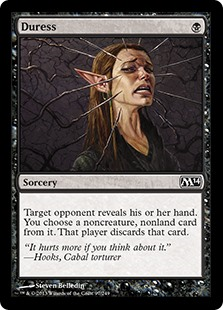 Esper and Jeskai Control often have the advantage against UW because they can use discard and burn respectively to dictate the flow of the game. In the former match, the game becomes about card advantage, as Esper's discard either strips relevant cards from UW or clears the road to resolve its own spells, forcing UW to find the right answers or die. In the latter, life total matters, since Jeskai is able to gradually whittle down UW with burn spells. The onus is on UW to either change the field of battle or win first.
Esper and Jeskai Control often have the advantage against UW because they can use discard and burn respectively to dictate the flow of the game. In the former match, the game becomes about card advantage, as Esper's discard either strips relevant cards from UW or clears the road to resolve its own spells, forcing UW to find the right answers or die. In the latter, life total matters, since Jeskai is able to gradually whittle down UW with burn spells. The onus is on UW to either change the field of battle or win first.
One of the greatest examples of control-mirror mastery is the 2002 World Championships. Carlos Romao won because he understood the Psychatog mirror better than everyone else. Psychatog was a UB control deck packed with counters and card advantage which won by casting Grave Upheaval, then Psychatog with floating mana. The accepted strategy was to counter all the card draw spells to prevent the opponent assembling the combo. Carlos and his team realized that doing so used up counters that could answer the combo. Instead, he saved his counters for the few win conditions his opponents had, and enjoyed a very easy run to the championship. Don't always fight the fight your opponent wants; pick what your deck is best at and leverage that aspect against the opponent.
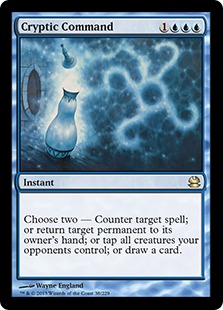 Victory Is Assured
Victory Is Assured
Control decks have a reputation for being hard to play against, and while this can be true, it doesn't have to be. The fear that reputation creates is so potent that players attempt to play around control. Sometimes this mindset is fine because the deck can fight on equal terms, but frequently, it just plays into control's strengths by giving it more time. As a result, players need to evaluate their decks and play without letting a fear of control dictate the matchup.


